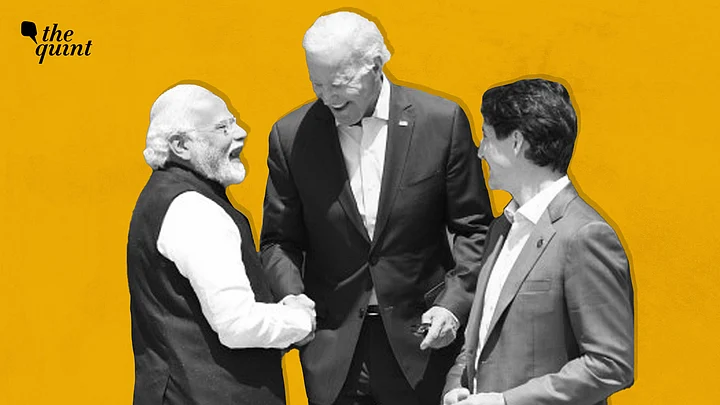Washington’s perceived 'harsh response’ to the India-Canada fracas has sparked both suspicion and pessimism in some quarters in India. Skeptics have sought to highlight the unreliability of the US as a partner while pessimists have argued that this incident is likely to press the US to re-evaluate its relationship with India.
It's part of the far-reaching ripples caused by the Canadian Prime Minister Justin Trudeau’s statement in the Parliament implicating "agents of Government of India” in the extrajudicial killing of a Canadian citizen and Khalistani Separatist Leader, Hardeep Singh Nijjar.
Trudeau’s accusation has put Ottawa’s intelligence allies, the Five Eyes, and especially the United States in an uncomfortable position of picking sides between a long-time alliance primarily defined by shared values (Canada) and a newly emerging security partnership based on shared interests (India).
Nevertheless, it is worth wondering why the US or Canada refrained from raising the matter publicly until lately if they had the preliminary intel establishing an Indian hand in Nijjar’s killing.
Perception Management Is The Key
Reacting to the accusations, the US National Security Advisor, Jake Sullivan, stated, “There's not some special exemption you get for actions like this. Regardless of the country, we will stand up and defend our basic principles.” Later, the US Secretary of State, Antony Blinken, pitched in too, saying, “We are extremely vigilant about any instances of alleged transnational repression, something we take very, very seriously.”
Furthermore, the US ambassador to Canada, David Cohen, confirmed that “this was a matter of shared intelligence information… There was a lot of communication between Canada and the United States about this.”
However, a recognition of at least three factors seems necessary before passing a verdict on the state of India-US relations in the aftermath of this incident. The following assessment might contrastingly indicate that India-US relations will likely sail through this hiccup. However hard one may argue the merits of India’s alleged actions, the incident has caused a great deal of embarrassment to the US especially after Canada chose to go public with the accusation.
Pushed against the wall, the US had a reputation to salvage. Not coming out in support of its long-standing ally would reflect badly on its commitment to alliances, so its reaction is understandable and even legitimate.
Clearly, Trudeau’s statement forced the Biden administration to respond publicly. Furthermore, the US response has been lukewarm and lackadaisical at best when compared to its stern reaction to Saudi Arabia’s extermination of Jamal Khashoggi – a US permanent resident and journalist in 2018. His killing, an extremely emotive issue for the US, thus, quickly snowballed into a domestic challenge for Biden, and yet the Saudi-US relations endured.
In this light, given that Nijjar was a Canadian citizen charged with terrorism in India, gives reason to believe that the India-US relations will likely withstand the current headwinds.
Interests Trump Values in Geopolitics
The incident presents a classic case of the 'Idealism vs Realism' debate. More often than not, great powers have shown the willingness to keep aside values (like Democracy and the Rule of Law) in favour of mutual interests. America’s Cold War alliances are replete with examples where it compromised values to further its interests.
India-US relations are driven more by shared interests rather than shared values.
New Delhi’s wavering commitment to the notions of "free society” and "democratic values” has been a subject of concern for the Congress and the civil society in America.
Often, reservations about democratic backsliding, press freedom, minority rights, and majoritarianism in India have been expressed through various working committees and media reports. But while these issues have remained a matter of public and private discussions, it has not prevented cooperation on pressing issues between the two countries. Relations with India are too vital a cog in the US’s Indo-Pacific strategy to be damaged beyond repair by an incident such as this one.
Nijjar’s Terror Record
Notwithstanding the seriousness of the allegations leveled against India and the US’s legitimate need to condemn such operations (if true) committed by a fellow democracy, the case has also brought to light the safe haven that Canada continues to offer to the Sikh separatists under the pretext of free speech.
Nijjar was a wanted terrorist in India for his links with Khalistan Commando Force (KCF), a banned terror outfit in India involved in the killing of over 200 people in Punjab during the late 1980s and early 1990s. He was also charged with planning, plotting, and financing terror attacks in India with help from Pakistan’s ISI along with more than a dozen murders.
Thus, with Nijjar's terror records as evidence, Canada’s outcry is unlikely to garner substantial support from the US besides casual lip service.
An appreciation of the above three factors indicates that the India-US relationship is likely to weather the current storm given the broader scope of their bilateral relations.
However, this is not to suggest that this deepening strategic convergence allows India an extended run or regular free pass. India shall be prudent in spending its diplomatic capital.
(Amit Kumar is a Research Analyst with the Indo-Pacific Studies Programme at the Takshashila Institution. This is an opinion piece and the views expressed above are the author’s own. The Quint neither endorses nor is responsible for the same.)
